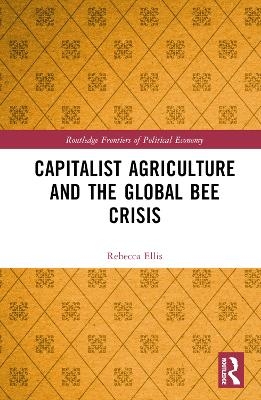
Capitalist Agriculture and the Global Bee Crisis
Routledge (Verlag)
978-0-367-69561-3 (ISBN)
Capitalist agriculture relies heavily on the pollination work of bees, but this system harms bees in innumerable ways. Indeed, human agriculture is one of the main culprits for the declining populations of wild bees and the declining health of honeybees. This book presents a political ecology of pollination that critically examines how managed honey bees and wild bees are harmed by capitalist agriculture.
The book focuses on the three most urgent problems: the standardization and simplification of landscapes through monocultures; the use of pesticides including neonicotinoids, other insecticides, herbicides, and fungicides; and the embeddedness of commercial, migratory beekeeping in the capitalist agriculture system which, among other things, has the potential to spread pests and pathogens across continents. At the heart of this crisis is the power and influence that a small group of agrochemical corporations have over national and international agricultural policy. The book argues for an interspecies alliance of small-scale farmers, bee advocates, beekeepers, environmentalists, and bees themselves, along with a vision for an agricultural system that nurtures multispecies flourishing.
This book will be of significant interest to readers of political ecology, animal geography, environmental anthropology, food system studies, and critical animal studies.
Rebecca Ellis holds a PhD in Geography and Environment (2021) from Western University in London, ON, Canada. Her research project, "Pollinator People: An ethnography of bees, bee advocates and possibilities for multispecies commoning in Toronto and London, ON", examined the entangled and embodied relationship between people and urban bees. She received her BA (2008) and MA (2010) in Anthropology from Western University. Her MA research focused on the role of community gardens in a rapidly gentrifying neighbourhood in Toronto, Canada. Her research interests include animal geographies, political ecology, social reproduction theory, and sustainable food systems. Rebecca works as an adjunct professor at Western University and Algoma University. In addition to studying bees, agriculture, and sustainable food systems, she is a beekeeper, urban farmer, and long-time community activist.
1. Introduction: The global pollinator crisis and human agriculture 2. Bees in the capitalocene 3. The Apis-Industrial Complex: the commodification of the lives and work of honeybees 4. Toxic flowers and uncertain science: pesticides and bees 5. Bee-washing: agrochemical corporations and struggles over neonicotinoids 6. Which bees shall we save? Debates over honey bee harm to native bees 7. Pollinator People: hopeful possibilities for multispecies flourishing in cities 8. Conclusions: Building movements to confront capitalist agriculture
| Erscheinungsdatum | 30.08.2022 |
|---|---|
| Reihe/Serie | Routledge Frontiers of Political Economy |
| Verlagsort | London |
| Sprache | englisch |
| Maße | 156 x 234 mm |
| Gewicht | 453 g |
| Themenwelt | Naturwissenschaften ► Biologie ► Ökologie / Naturschutz |
| Technik ► Umwelttechnik / Biotechnologie | |
| Wirtschaft ► Volkswirtschaftslehre ► Wirtschaftspolitik | |
| Weitere Fachgebiete ► Land- / Forstwirtschaft / Fischerei | |
| ISBN-10 | 0-367-69561-8 / 0367695618 |
| ISBN-13 | 978-0-367-69561-3 / 9780367695613 |
| Zustand | Neuware |
| Informationen gemäß Produktsicherheitsverordnung (GPSR) | |
| Haben Sie eine Frage zum Produkt? |
aus dem Bereich


